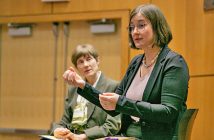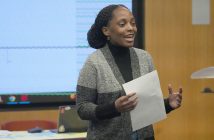Hope and faith are common threads in American pop culture, and Kathryn Reklis, Ph.D., an assistant professor of theology, often addresses both in a monthly column in the journal The Christian Century. Reklis sat down with with us recently to talk about how, after a year in which hope has been in short supply, it’s still alive today.
Listen here:
Full transcript below
Patrick Verel: Your work has led you to write about social media, books, movies and TV shows, most recently NBC’s, The Good Place. How do you decide what to write about?
Kathryn Reklis: I always will look for things that I, myself, personally love. Strangely, some of the things I love the most I can’t write about them right away. Maybe it’s I’m too invested in them or they’re too close to home. I don’t want to step back and really think about them more critically, but they might be percolating for a while. I also try to pay attention to what is really popular. If something is sort of sweeping up broad, big cultural conversations, even if it’s not something I might choose to watch or read on my own, I will probably take a look at it.
On the opposite end of the spectrum, I also look for things that people might not be paying attention to, that are not necessarily getting as much mainstream coverage, and could I hold them up as something interesting or exemplary to pay attention to. I probably also look for themes a lot, with sort of unexpected connections. Ways that maybe two different shows or a crop of movies or shows or podcasts or music albums that are sort of dealing with similar themes across a lot of different genres or platforms, and what that might say that’s interesting about our culture, about the moment that we’re in.
Patrick Verel: What’s one that you had to let percolate for a while?
Kathryn Reklis: One that I know is already like that for me is the new HBO series, The Deuce. I really loved the first season of that show. I think there are many fascinating and interesting things going on about it and there’s no way I could write about it. But it’s gonna be an ongoing series and so I’m hoping over time. Transparent was a series like that for me. I love it. I did write about it after the first season finished, but I have since watched it and felt like I could write about it all the time.
Patrick Verel: When you find examples of religion in American pop culture, what does it tend to focus on?
Kathryn Reklis: It’s actually been one of my sort of rules to myself in how I think about writing about pop culture, is not really to look for explicitly religious themes in shows, but to try to think about what these different cultural objects or experiences might help us understand about ourselves or the moment that we’re living in.
Patrick Verel: The most recent one that you featured, that was this show The Good Place.
Kathryn Reklis: Mm-hmm (affirmative). So, that’s an example. I was aware when that show came out a couple years ago. I saw a preview for it and I thought, oh, I don’t know, that looks kind of cheesy or not sure that I’m that interested in that. Then, I kept hearing about it and then people I trust and admire were saying, “Oh, it’s a really great show.” So, I started watching it. I was a big fan of the creators’ earlier sitcom Parks & Rec, such an optimistic show about civic involvement and about this loan. Idealistic, committed, public servant who is gonna make her community better through diligent, earnest, I mean almost laughably earnest, commitment to her ideals, and now I feel like in this particular moment, that is just, it’s almost painful. It’s not funny anymore.
Here’s a show that’s playing with similar comedic beats and rhythms, but is pressing a different point, right? Really asking us to think about what we mean by sort of, kind of just common, run of the mill, ordinary on the street level goodness. Like, what do we mean to be a good person and why has it become so hard to seem to have a cultural standard around basic goodness or civility in our sort of larger culture? So, it intrigued me in that way, right, and really drew me in as saying something that we might need to be paying attention to now, that even in a couple years ago, might have felt forced or more cheesy and not it actually feel like almost morally serious, even though it’s a very funny show.
Patrick Verel: Now this has been an excruciating year for many people. Do you see signs of hopefulness in either your studies or in the media in general?
Kathryn Reklis: Speaking just about pop culture or writing about pop culture, I mean, to some degree, the last couple months have been excruciating in that realm as well, with just revelation after revelation of sexual abuse and misconduct, which has left me feeling like the entire culture industry is just built on this sort of rotten foundation of misogyny and misused power. But I would say that I think over the last few years, even in the last year, more diverse voices, more people of color, more women are making cultural objects and experiences are getting a broader outlet for that work. I don’t think it’s, the problem’s not solved but there are, I think, little glimmers of hope that different stories are starting to be told and different voices are starting to be held up, and hopefully underneath that slightly different power structures of who gets to decide what stories are told and what voices are held up. So I think it’s a small sliver of hope.
If you think about media much more broadly, not just the pop culture, but social media, then I was probably at the point, even a year ago, where I was starting to be suspicious that as much I have studied and written about and thought about social media, that maybe it really was just a distraction machine designed to sell us advertisement. But in the last year, I’ve also really felt experienced for myself. Certain social media networks, really in my community, I live in Astoria, Queens, and community groups that sprung up online, but have really taken on offline activity too. So, it’s given me hope that actually it is a tool that this new media age that we’re living in, this sort of social media age we’re living in, can also be a tool for real community connection.
Patrick Verel: What’s been the most inspiring story you’ve come across recently?
Kathryn Reklis: A story that really, I mean just resonated, I think about it all the time that really resonated with me was actually an interview that I read online with the anthropologist, Anna Tsing, who has just written a book called The Arts of Living at the End of the World. She’s an anthropologist of basically, well, many things, but the kind of industrial technologies that humans have unleashed that are destroying the very prospects of any form of life on the planet, which is a very of course depressing and not particularly helpful topic, and yet this new work and the way she talks about it, of trying to look for examples in the non-human natural world, as well as the humanly influenced world of possibilities of life, sort of existing over, under, within and connections of living organisms, human and non-human that I think offer us really, it’s not a blueprint, it’s not an easy like, here are five steps to save the planet, but a sort of vision of paths not taken or ways we might imagine what it means to live into a future that we are also partly responsible for destroying. So, maybe that’s not hopeful to other people, but I found it, it stuck with me as, in actually my deepest moments of despair as something to return to.
Patrick Verel: Is there anything about the field of theology that lends itself to hopefulness?
Kathryn Reklis: There’s a very classic or standard understanding of theology, especially of Christian theology, but other theologies too as being all about a kind of hopefulness. Hope in the next life, hope in future justice, hope in ways to make ourselves better people or to redeem ourselves. Then that’s the exact same thing that becomes one of the most strident criticisms of religion and of Christianity, in particular. It gives us false hope where we put all our hopes on some future moment that may or may not come to be and it prevents us from doing anything real and sustained in this world.
For me, a lot of my work as a teacher and scholar is to try to really pull back the layers of how it is we got to where we are. A sort of history of the moment we’re in and where it comes from. A lot of that is to see how it is constructed, right? It’s made by humans, it’s the product of human activity. But to say that something’s made by us doesn’t mean it’s not real.
In some ways … So, there’s an easy way to say, well, if it’s not natural or biological or given, then it’s just fictional or made up. But in another way, the things that we make in these deep structural societal ways are maybe the most real things because now we’re invested in protecting them and sort of building our lives around them. So, for me peeling them back just to see how much power they exert on us, how deeply and fundamentally they shape who we are and our variability to think the kinds of thoughts that we have. Yet at the same time, in doing that to see that they don’t have to be the way that they are. That in them it’s not easy work, you can’t change anything in a sort of whole scale way. There’s no easy solution but there’s a, it’s like a crack or a fissure or a little opening towards a path not taken or a future not yet realized, and that is to me why I’m in this work.


